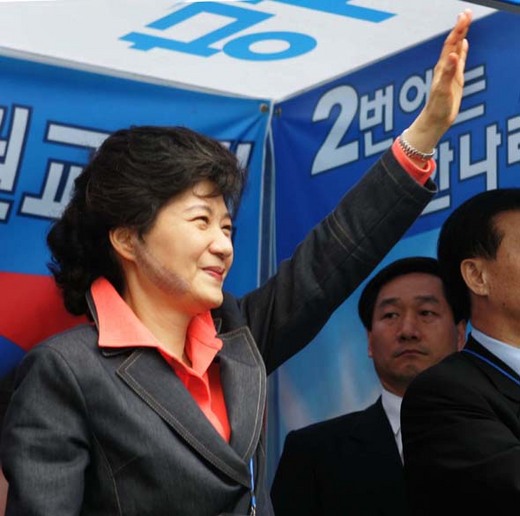 |
|
Park Geun-Hye, chairwoman of opposition Grand National Party, is waving her hand to her supporters at as campaign rally in Taejun May 29. Taejun/Lee Jong-chan
|
Effects of additional effort on elections unclear
Nine days after being slashed in the face at a campaign rally, opposition Grand National Party chairwoman Park Geun-hye was released from the hospital Monday morning and headed straight to Daejeon, where a tight race is underway for tomorrow’s regional elections. "Please be understanding of the fact I can’t greet you and appeal for your votes in a big voice, even though I’d like to," Park told a crowd gathered in Daejeon’s famous downtown Eunhaeng-dong district, where she is campaigning on behalf of local Grand National Party (GNP) candidate Park Seong-hyo. She spoke carefully and seemed to struggle to enunciate, but for three minutes she called on the crowd to support the GNP. On Tuesday, Ms. Park will be in Jeju, where she will campaign for her party’s candidate for provincial governor, who is also fighting a tight race.Observers say the reason the GNP head is hot on the campaign trail right out of the hospital, despite concerns about her physical condition, is because she wants to make an even bigger win out of what is expected to be an overwhelming victory for the GNP. She also wants to further solidify her position within the party, particularly when she is expected to seek its nomination for president, the observers say. Views differ on the effect Ms. Park’s additional campaigning will have on Wednesday. One GNP official expects the "Park Geun-hye wind" to give the GNP an additional five or six points in Daejeon and Jeju, where GNP candidates and their opponents are so neck-and-neck preliminary poll results fall within the margin of error. Bak Seong-min, of the political consulting firm Min Consulting, said it is still too early to tell whether sympathy for Park will have much of an effect. "It might influence people who are undecided, but not many, and not by much," he said. A Uri Party official said that Park’s active participation in street campaigning could actually hurt the GNP. "Voters around the country might start to worry that the GNP could sweep the whole country if it campaigns very hard in Daejeon and Jeju," the official said, saying that undecided voters in the Jeolla provinces and Seoul could then try to damper the effects of such a sweep by voting for GNP rivals. Im Sang-ryeol of the company Research Plus suggested Ms. Park felt the need to get actively involved in campaigning again because otherwise she would only be credited with contributing the "sympathy vote." Meanwhile, civic groups and the ruling Uri Party, expecting an overwhelming defeat in tomorrow’s elections, are complaining about Ms. Park’s post-attack canvassing. An umbrella group of civic organizations in Daejeon created to monitor the campaign said that Ms. Park’s decision to campaign in the provinces "makes the partisan confrontation even worse," and that "using the attack for political purposes will earn criticism and ultimately not be desirable for the GNP." "You can’t blame the chairperson of a political party for helping one of its candidates," said Uri spokesman Woo Sang-ho. "But we ask that she not use the attack on her for partisan purposes."





